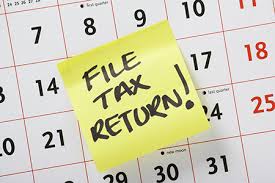Is Innovation Dead in Personal Tax?

It’s that time of year again. Alongside Christmas shopping and mince pie eating, many of us need to start thinking about our taxes. You may be one of the 12 million UK residents that needs to file their self-assessment tax returns at the end of January, but it doesn’t have to be accompanied by the regular annual sense of dread.
We have compiled some advice below to help those that go down the DIY route, but we have also launched an innovative ‘Personal Level Package’ for those who want to focus on the more important things, whilst letting someone else take the strain.
The Super Simple Summary (for those busy people)
• Personal tax returns (Self Assessments) are due no later than 31 January 2016
• Tax payments are due no later than 31 January 2016
• Your options: keep reading on for our useful Do It Yourself tips, or consider joining our innovative Personal Level Package to save you time and effort
The Next Level Business ‘Personal Level Package’
• What is it? An innovative fixed monthly plan (just like your mobile phone) to sign up to via direct debit, from just £12 a month. You can cancel at any time with our happiness guarantee
• What do I get? After our quick online sign-up, each year you will receive an an annual reminder, an easy questionnaire to complete and we’ll prepare and file the forms for you, calculating your payment to be made to HMRC. You’ll also receive our useful tax tips (which could save you more than our annual membership fee!)
• Can I join anytime? Yes, we don’t charge you more for joining late, we simply work out what months you need to catch up to cover your annual membership fee
• How can I join or enquire? Give us a call on 0207 412 8381.
Doing it Yourself
What’s the deadline?
Anyone who received a taxable income that wasn’t covered by PAYE – where taxes are deducted automatically by an employer – in the tax year to 5 April 2015 needs to complete a tax return and file it online by the 31st January 2016.
You’ve already missed your chance to file a paper tax return, the deadline for which passed at the end of October. You’ve been able to file your online return since April, too, but the final date this can be done – and the tax paid – is the end of January. Failure to meet this could trigger a fine of £100 plus £10 a day.
Do I need to fill out a tax return?
You must fill out a tax return if you are: self-employed and work alone as a sole trader; are a partner in a business, or are a company director (unless it’s an unpaid position for a non-profit organisation or charity). You also need to fill one out if you are employed and pay taxes through PAYE but earn self-employed income too.
There are other circumstances where you may have to fill out a self-assessment form. For example, if you are a higher rate taxpayer you’ll need to fill out a tax return to claim back additional tax relief on your pension contributions. If you or your partner earn more than £50,000 a year and claim child benefit you have to fill out a self-assessment form to pay some of the benefit back.
If you aren’t sure if you need to fill out a form you can check here.
What do I need to declare?
You have to report everything you’ve earned over the tax year from 6 April 2014 to 5 April 2015. This includes income from employment, self-employment, income from property and interest and gains on your savings and investments.
Even if all your savings and investments are in ISAs you still have to declare them, despite the fact no tax should be due.
What should I have to hand?
Before you start filling out the forms, gather up all the paperwork you need (e.g. invoices, bank statements, pay slips, household bills etc.).
How can I cut my bill?
There are a whole host of ways you can reduce your tax bill. The main one is by claiming expenses, as businesses (even if you are just a one-man band) do not have to pay VAT on costs incurred in the day-to-day running of their operations.
If you are self-employed you can also claim a number of expenses from energy costs (if you work from home), to stationery and travel costs. You can even expense a portion of your mortgage interest if you are a landlord in some cases.
The taxman explains what expenses you can claim and how to calculate them here.
If you are likely to have a reasonably large tax bill and are unsure about any element of your tax return, it is a good idea to employ an accountant to help you. They will charge at least £150 in most cases, but are likely to cut your tax bill by
far more than that thanks to their expert knowledge.
What were the allowances for 2014/2015?
In the tax year 2014/15 most people had a personal allowance – that’s how much you can earn before income tax is due – of £10,000. If you were born between 6 April 1938 and 5 April 1948 then your personal allowance rises to £10,500 and those born before 6 April 1938 can have an income of up to £10,660 before they are liable for income tax.
You could save up to £11,880 into an ISA over the tax year, with up to £5,940 of that in a cash ISA. If you have been saving into a pension the maximum you could put in for the year, and benefit from tax relief is £40,000.
Finally, your capital gains allowance for the 2014/15 tax year was £11,000.
Tax return 2015: 5 tips for filling in your self-assessment form
Anyone who received a taxable income that isn’t covered by PAYE in the year to 5 April 2015 needs to complete a tax return as soon as possible. The deadline for passing a paper tax return passed on 31 October, so the only option is to complete a self-assessment online.
If you have started to receive non-PAYE income since last April you won’t need to fill in a tax return this year, but the advice below will help you to prepare for next year’s deadline. It pays to be well prepared: if you are late you’ll face hefty fines of £100 plus £10 a day up to a 90-day maximum of £900. That means that if you file your tax return three months late you’ll pay a £1,000 fine. After that you’ll pay a further £300 or 5 per cent of the total due – whichever is higher – on top of that initial £1,000. Then after 12 months another fine of £300 or 5 per cent on top of the previous charges.
Even if you can’t afford the bill you should still file your return. The fines for late payment are a lot lower than the fines for late filing. So, take the time to get your self-assessment underway now to avoid those fines.
Here are five tips to make sure you file your assessment accurately, on time and without mistakes that could leave you paying unnecessary tax.
Top Tip 1 – Get help or get your paperwork together for DIY
No one likes doing their tax return. It is fraught with stress at just the wrong time of year and mistakes are easily made. A digital chartered accountant can help take this pain away. At Next Level Business, you can join our personal tax return package from as little as £12 (ex. VAT) per month. This gives you a reminder each year well ahead of time, followed by a simple questionnaire to fill in and then we do the rest. It’s an all-online, all-digital, quick and stress-free process.
If you want to go down the DIY route, in order to fill out your tax return you are going to need to have details of everything you have earned over the tax year (that’s 6 April 2014 – 5 April 2015). This includes income from employment, self-employment, income from property, and other income and gains such as interest received on savings or investment returns. Hopefully you’ve kept neat records and can easily lay your hands on all that info. If you can’t, then you need to start gathering it fast. You’ll also need to have a record of all your deductible expenses in order to make sure you aren’t paying tax unnecessarily.
Top Tip 2 – Understand the tax return forms
Self-assessment is a complicated thing and it can be very easy to make mistakes on the forms, so start familiarising yourself with all the questions and make sure you understand everything.
If this is the first time you have filed a return, or you aren’t sure you’ve been getting it right, it can be well worth getting additional help, especially if you’re expecting a large bill. An accountant will charge you upwards of £150, but don’t forget that they could help you bring down your tax bill by ten times that.
Top Tip 3 – Don’t be afraid to claim expenses
If you work from home there are plenty of expenses you can claim on your tax bill in order to reduce it. For example, you can claim for energy costs but only those that cover when and where you were working. So if you have a six room house and one room is your office, you need to take your energy bills and divide them by six. You must then work out how much you time you are working for, and claim energy bill costs that cover that time. You can also expense mortgage interest in the same way.
Also, don’t be afraid to make educated guesses. If you haven’t kept a meticulous record of your stationery expenses, but know you spend around £20 a month for example, put that down. If HMRC thinks you’ve been wildly extravagant, they will of course investigate!
Top Tip 4 – Learn from your tax return mistakes
Reduce your stress levels next year by learning from your mistakes this year. If you are rushing round trying to find evidence of your income or expenses, or have left filing your tax return to the last minute, don’t do it again.
Remember, you can file your return any time from the end of the tax year until the end of the following January, when the actual bill is due. There is plenty of time to get organised, and there’s no excuse to leave it until the deadline looms.
Top Tip 5 – Tax return in – now don’t forget to pay the bill!
Once you’ve filed your return and know how much you owe the tax man, don’t forget to actually pay it! You must pay your tax bills for the 2014/15 tax year by 31 January 2016 otherwise you’ll face fines for late payment. Just put a note in your diary to make sure it doesn’t go amiss in your busy schedule of dieting, abstaining from the booze and wishing you had joined our Personal Level Package after all.


